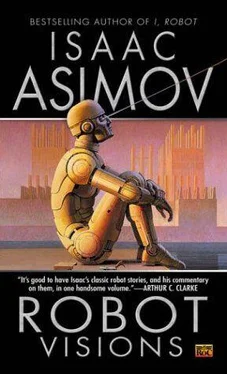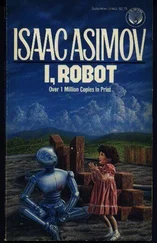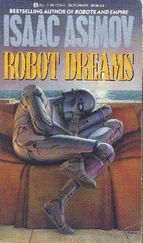Isaac Asimov - Robot Visions
Здесь есть возможность читать онлайн «Isaac Asimov - Robot Visions» весь текст электронной книги совершенно бесплатно (целиком полную версию без сокращений). В некоторых случаях можно слушать аудио, скачать через торрент в формате fb2 и присутствует краткое содержание. Жанр: Фантастика и фэнтези, на английском языке. Описание произведения, (предисловие) а так же отзывы посетителей доступны на портале библиотеки ЛибКат.
- Название:Robot Visions
- Автор:
- Жанр:
- Год:неизвестен
- ISBN:нет данных
- Рейтинг книги:5 / 5. Голосов: 1
-
Избранное:Добавить в избранное
- Отзывы:
-
Ваша оценка:
- 100
- 1
- 2
- 3
- 4
- 5
Robot Visions: краткое содержание, описание и аннотация
Предлагаем к чтению аннотацию, описание, краткое содержание или предисловие (зависит от того, что написал сам автор книги «Robot Visions»). Если вы не нашли необходимую информацию о книге — напишите в комментариях, мы постараемся отыскать её.
Robot Visions — читать онлайн бесплатно полную книгу (весь текст) целиком
Ниже представлен текст книги, разбитый по страницам. Система сохранения места последней прочитанной страницы, позволяет с удобством читать онлайн бесплатно книгу «Robot Visions», без необходимости каждый раз заново искать на чём Вы остановились. Поставьте закладку, и сможете в любой момент перейти на страницу, на которой закончили чтение.
Интервал:
Закладка:
It was prosthetology that finally took Andrew off the Earth.
In the decades that followed the celebration of his sesquicentennial, the Moon had come to be a world more Earthlike than Earth in every respect but its gravitational pull; and in its underground cities there was a fairly dense population. Prosthetized devices there had to take the lesser gravity into account. Andrew spent five years on the Moon working with local prosthetologists to make the necessary adaptations. When not at his work, he wandered among the robot population, every one of which treated him with the robotic obsequiousness due a man.
He came back to an Earth that was humdrum and quiet in comparison, and visited the offices of Feingold and Martin to announce his return.
The current head of the firm, Simon DeLong, was surprised. “We had been told you were returning, Andrew”- he had almost said Mr. Martin- “but we were not expecting you till next week.”
“I grew impatient,” said Andrew briskly. He was anxious to get to the point. “On the Moon, Simon, I was in charge of a research team of twenty human scientists. I gave orders that no one questioned. The Lunar robots deferred to me as they would to a human being. Why, then, am I not a human being?”
A wary look entered DeLong’s eyes. “My dear Andrew, as you have just explained, you are treated as a human being by both robots and human beings. You are, therefore, a human being de facto.”
“To be a human being de facto is not enough. I want not only to be treated as one, but to be legally identified as one. I want to be a human being de jure.”
“Now, that is another matter,” DeLong said. “There we would run into human prejudice and into the undoubted fact that, however much you may be like a human being, you are not a human being.”
“In what way not?” Andrew asked. “I have the shape of a human being and organs equivalent to those of a human being. My organs, in fact, are identical to some of those in a prosthetized human being. I have contributed artistically, literally, and scientifically to human culture as much as any human being now alive. What more can one ask?”
“I myself would ask nothing more. The trouble is that it would take an act of the World Legislature to define you as a human being. Frankly, I wouldn’t expect that to happen.”
“To whom on the Legislature could I speak?”
“To the Chairman of the Science and Technology Committee, perhaps.”
“Can you arrange a meeting?”
“But you scarcely need an intermediary. In your position, you can-”
“No. You arrange it.” It didn’t even occur to Andrew that he was giving a fiat order to a human being. He had grown so accustomed to that on the Moon. “I want him to know that the firm of Feingold and Martin is backing me in this to the hilt.”
“Well, now-”
“To the hilt, Simon. In one hundred and seventy-three years I have in one fashion or another contributed greatly to this firm. I have been under obligation to individual members of the firm in times past. I am not, now. It is rather the other way around now and I am calling in my debts.”
“I will- do what I can,” DeLong said.
The Chairman of the Science and Technology Committee was from the East Asian region and was a woman. Her name was Chee Li-hsing and her transparent garments- obscuring what she wanted obscured only by their dazzle- made her look plastic-wrapped. “I sympathize with your wish for full human rights,” she said. “There have been times in history when segments of the human population fought for full human rights. What rights, however, can you possibly want that you do not have?”
“As simple a thing as my right to life,” Andrew stated. “A robot can be dismantled at any time.”
“A human being can be executed at any time.”
“Execution can only follow due process of law. There is no trial needed for my dismantling. Only the word of a human being in authority is needed to end me. Besides- besides-” Andrew tried desperately to allow no sign of pleading, but his carefully designed tricks of human expression and tone of voice betrayed him here. “The truth is I want to be a man. I have wanted it through six generations of human beings.”
Li-hsing looked up at him out of darkly sympathetic eyes. “The Legislature can pass a law declaring you one. They could pass a law declaring that a stone statue be defined as a man. Whether they will actually do so is, however, as likely in the first case as the second. Congress people are as human as the rest of the population and there is always that element of suspicion against robots.”
“Even now?”
“Even now. We would all allow the fact that you have earned the prize of humanity, and yet there would remain the fear of setting an undesirable precedent.”
“What precedent? I am the only free robot, the only one of my type, and there will never be another. You may consult U.S. Robots.”
“`Never’ is a long word, Andrew- or, if you prefer, Mr. Martin- since I will gladly give you my personal accolade as man. You will find that most congress people will not be so willing to set the precedent, no matter how meaningless such a precedent might be. Mr. Martin, you have my sympathy, but I cannot tell you to hope. Indeed-”
She sat back and her forehead wrinkled. “Indeed, if the issue grows too heated, there might well arise a certain sentiment, both inside the Legislature and out side, for that dismantling you mentioned. Doing away with you could turn out to be the easiest way of resolving the dilemma. Consider that before deciding to push matters.”
Andrew stood firm. “Will no one remember the technique of prosthetology, something that is almost entirely mine?”
“It may seem cruel, but they won’t. Or if they do, it will be remembered against you. People will say you did it only for yourself. It will be said it was part of a campaign to roboticize human beings, or to humanify robots; and in either case evil and vicious. You have never been part of a political hate campaign, Mr. Martin; but I tell you that you would be the object of vilification of a kind neither you nor I would credit, and there would be people to believe it all. Mr. Martin, let your life be.”
She rose, and next to Andrew’s seated figure she seemed small and almost childlike.
“If I decide to fight for my humanity, will you be on my side?”
She thought, then replied, “I will be- insofar as I can be. If at any time such a stand would appear to threaten my political future, I might have to abandon you, since it is not an issue I feel to be at the very root of my beliefs. I am trying to be honest with you.”
“Thank you, and I will ask no more. I intend to fight this through, whatever the consequences, and I will ask you for your help only for as long as you can give it.”
It was not a direct fight. Feingold and Martin counseled patience and Andrew muttered, grimly, that he had an endless supply of that. Feingold and Martin then entered on a campaign to narrow and restrict the area of combat.
They instituted a lawsuit denying the obligation to pay debts to an individual with a prosthetic heart on the grounds that the possession of a robotic organ removed humanity, and with it the constitutional rights of human beings. They fought the matter skillfully and tenaciously, losing at every step but always in such a way that the decision was forced to be as broad as possible, and then carrying it by way of appeals to the World Court.
It took years, and millions of dollars.
When the final decision was handed down, DeLong held what amounted to a victory celebration over the legal loss. Andrew was, of course, present in the company offices on the occasion.
Читать дальшеИнтервал:
Закладка:
Похожие книги на «Robot Visions»
Представляем Вашему вниманию похожие книги на «Robot Visions» списком для выбора. Мы отобрали схожую по названию и смыслу литературу в надежде предоставить читателям больше вариантов отыскать новые, интересные, ещё непрочитанные произведения.
Обсуждение, отзывы о книге «Robot Visions» и просто собственные мнения читателей. Оставьте ваши комментарии, напишите, что Вы думаете о произведении, его смысле или главных героях. Укажите что конкретно понравилось, а что нет, и почему Вы так считаете.








